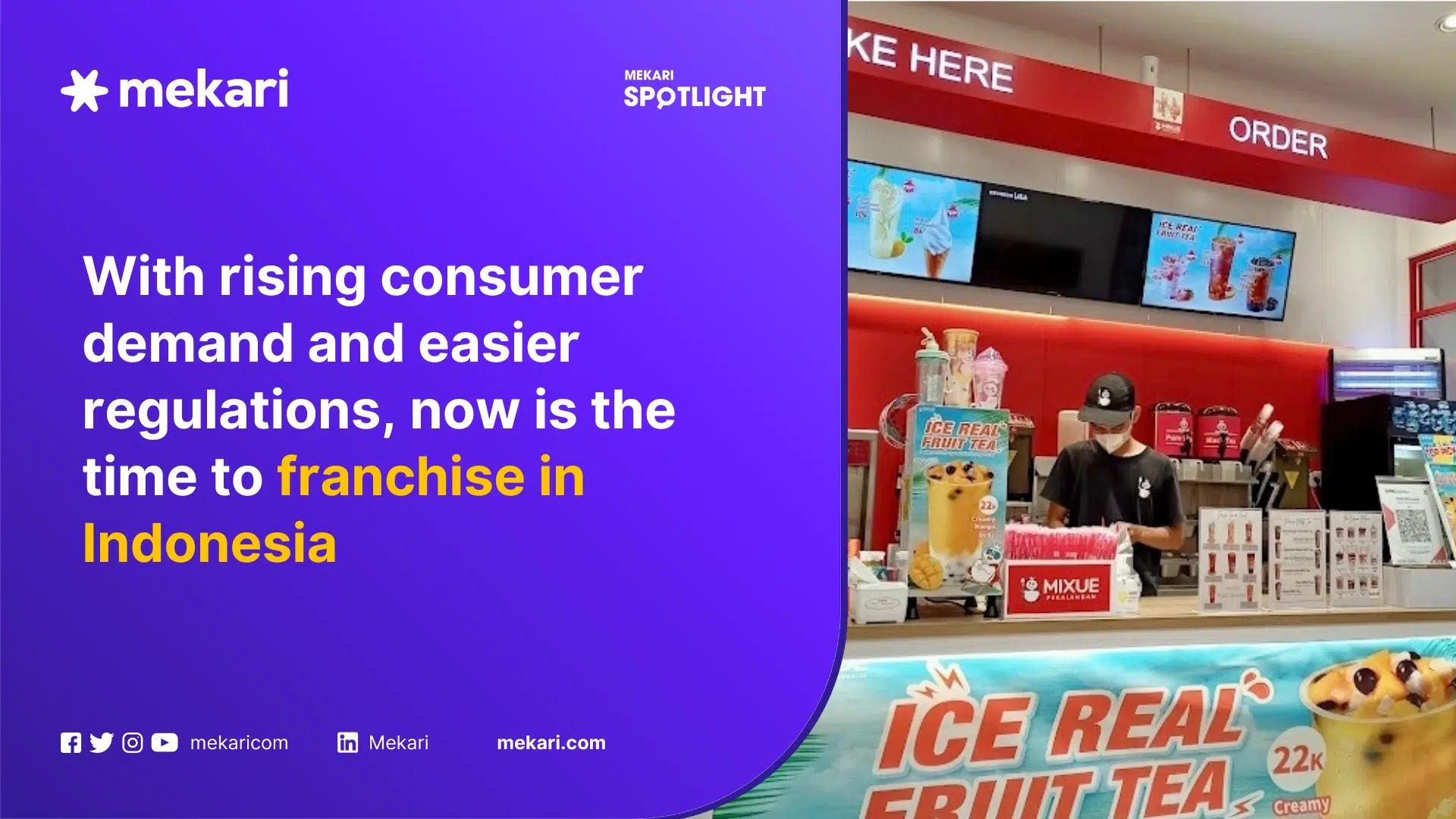Mekari Insight
- Indonesia’s franchise ecosystem is backed by strong regulations and big market potential.
- Legal compliance, structured growth, and reliable support systems are key to franchise success.
- Integrated SaaS like Mekari makes scaling your franchise faster, easier, and fully compliant.
Starting a franchise business in Indonesia can be a promising way to grow faster without starting from scratch.
With a growing middle class, high consumer spending, and an increasingly business-friendly environment, Indonesia offers fertile ground for both local and international franchisors.
In this guide, you’ll learn the essential steps, legal requirements, and practical tips to successfully build a franchise business—whether you’re a founder looking to expand or an investor exploring franchise opportunities.
Legal requirements and business structure

Before you launch, it’s important to understand the legal foundation of franchising in Indonesia. Here’s what you need to know:
1. Franchise laws & regulations
Government Regulation No. 35 of 2024 (GR 35/2024)
Effective 2 September 2024, this new regulation replaces the old GR 42/2007. It expands and refines the legal framework. Under GR 35/2024:
- The minimum profitability requirement is set at 3 years of operation (down from 5 years).
- Intellectual property (IP) must be registered before STPW application.
- STPW (Franchise Registration Certificate) is issued via OSS and remains valid indefinitely, until revoked for specified reasons.
- Franchisees and franchisors must use the new official franchise logo visibly at outlets.
- Mandatory annual reporting by 30 June each year.
- A three-stage sanction process: two warnings → temporary suspension → STPW revocation (with a five-year ban on reapplication).
Minister of Trade Regulation No. 71/2019 (MOT 71/2019)
This regulation remains valid as the implementing rule for GR 35/2024, issued on 3 September 2019. It originally simplified franchise rules by:
- Removing the 80% local content requirement.
- Eliminating the outlet cap (formerly 150/250).
- Allowing multiple master franchises.
- Requiring franchise agreements in Indonesian.
- Removing the clean-break letter requirement.
- Integrating OSS for STPW applications.
Read More: Payroll, Contracts & Employment Laws in Indonesia 20252. Mandatory documents & permits
To operate legally as a franchise in Indonesia, these are required:
STPW (Surat Tanda Pendaftaran Waralaba)
Issued via OSS on behalf of the minister (for franchisors) or regional officials (for franchisees). Valid indefinitely unless terminated due to cessation of business, IP expiration, franchise agreement termination (for franchisees), or violations.
Franchise agreement
Must be in Indonesian, governed by Indonesian law, and include mandatory clauses on IP, business system, support, territory, royalties, dispute resolution, duration, termination, and franchisee compensation.
Franchise prospectus
Also known as a Franchise Disclosure Document. Submitted to the Ministry via OSS. Must be provided 14 days before the agreement, fully in Indonesian.
It includes franchisor ID, business system SOPs, 2-year audited financials, IP certificates, list of outlets/franchisees, obligations, training systems, and more.
NIB (Nomor Induk Berusaha)
Business Identification Number issued via Indonesia’s OSS system. Required for overall business registration and operations.
Trademark registration
IP rights (trademarks, trade dress, patents, etc.) must be registered or recorded in Indonesia before applying for STPW.
3. Company structure
Local franchisors/franchisees
Must be established as a PT (Perseroan Terbatas) – the Indonesian limited liability company format.
Foreign franchisors
Must set up a PT PMA (Foreign Investment Company). Requires a minimum capital of IDR 10 billion (~USD 650k).
Step-by-step process to build a franchise
By following this roadmap, you build a franchise that isn’t just legally compliant—but structured for sustainable, scalable growth under Indonesia’s franchise regulations.
1. Validate your business model
- Ensure your business has proven profitability for at least three consecutive years and two years of audited financial statements—this fulfills GR 35/2024 criteria for STPW eligibility.
- Confirm your system can be replicated through written SOPs that are easy to teach and deploy.
- Make sure your brand is backed by registered IP in Indonesia, another mandatory requirement for registration.
2. Prepare franchise documents
- Draft the franchise agreement in Indonesian, with clauses covering IP, territory, support, duration, royalties, dispute resolution, and more—consistent with MOT 71/2019 and GR 35/2024 mandates.
- Create the franchise prospectus (disclosure document), including business profile, SOPs, legal entity info, financial data, fee structure, and registered IP. it must be provided in writing at least 14 days before signing and registered via OSS.
3. Register your franchise (STPW)
- Submit your agreement, prospectus, trademark, and legal company documents through OSS to the Ministry of Trade to obtain the STPW—mandatory to legally use the franchise label.
- ensure all materials are legitimate; operating without STPW or using the franchise brand without it may lead to severe sanctions.
4. Set up your business entity and licenses
- Register a PT (for local operators) or PT PMA (foreign investors) via OSS, including articles of association, IDR 10 billion paid‑up capital for PT PMA, NIB, NPWP, and applicable location‑based permits.
- Secure industry‑specific licenses (e.g. food & beverage, health) and ensure local office operations to maintain PT PMA legitimacy and STPW compliance.
5. Build training and support systems
- Develop comprehensive SOP manuals covering operations, HR, marketing, store layout, and more—these are legally required and essential for quality control .
- Prepare training materials and a support infrastructure (logistics, marketing, audits, a feedback channel) to meet continuous support obligations.
6. Launch and scale gradually
- Start with a pilot outlet to test your system and legal compliance in real-world conditions.
- Select franchisees carefully (considering capital, experience, values), guide them through setup, then monitor performance and legal compliance—including annual reporting and logo display rules.
- Expand strategically; avoid outpacing your support capacity, which could lead to operational and legal breakdowns.
Costs and investment overview

Starting a franchise business requires significant but manageable investment:
1. Initial costs
Franchise fee usually ranges from IDR 50–500 million depending on industry. This upfront fee grants the right to use the brand and business model.
Setup costs cover outlet design, equipment purchase, staff recruitment and training, and securing necessary licenses—expenses vary widely based on format and scale.
Read More: How to Scale A Business with Cost Effective Strategy2. Operational expenses
Ongoing costs include rent, employee salaries, raw materials, logistics, and marketing. These are dependent on outlet size, location, and industry specifics.
Read More: 25 Essential Business Expense Categories & How to Optimize It3. Royalties
Royalties typically range from 5–8 % of gross sales, paid regularly (monthly or quarterly). This compensates the franchisor for brand use, ongoing support, and systems.
Franchise businesses operate across multiple locations, systems, and teams—making it easy for data to become scattered and processes inconsistent.
Integrated SaaS, such as solutions from Mekari, solves this by:
- Connecting functions like accounting, HR, CRM, and operations into one ecosystem. This ensures that key data—from sales performance to staff payroll—flows seamlessly, helping franchisors make accurate, timely decisions and avoid costly errors.
- Maintain full legal compliance by automated tax reporting, payroll based on labor law, and e-signatures for contracts—all while securely storing data for audits. This significantly reduces manual workload, ensures consistency across outlets, and protects against regulatory risks.
Tips for long term franchise business success: integrated SaaS
As your franchise grows, Mekari integrated SaaS ensures scalability and brand consistency. Standard operating procedures, financial rules, and staff policies can be applied uniformly across all franchisees.
Franchisors gain centralized control, real-time insights, and the tools to monitor quality, performance, and compliance—laying the foundation for sustainable, long-term success.
Here’s how each Mekari product support your franchise business:
- Mekari Jurnal: automates accounting, cash flow, asset tracking, inventory, and outlet-level financial consolidation—accurately calculating fees and royalties while delivering audit-ready data
- Mekari Talenta: manages staff recruitment, attendance, payroll, and compliance with labor laws—ensuring uniform HR practices and legal payroll processing across franchises.
- Mekari Qontak: centralizes customer communication—WhatsApp, email, social—for consistent brand voice, coordinated support, and data-driven consumer insights.
- Mekari Klikpajak: automates Indonesian tax calculations, e-faktur, filings, and vendor reporting—removing errors and saving administrative time.
- Mekari Expense: controls operational spending—equipment, marketing, logistics—with approval flows and automatic syncing into Jurnal for full visibility.
- Mekari Officeless: enables low-code creation of compliance checklists and SOP-adherence audits (inventory, quality, permits), enforcing standards digitally at every outlet.
- Mekari Sign: digitizes contract and permit signing with legally binding e-signatures and e-stamps, centralizing document storage and ensuring franchise agreements—anytime, anywhere.

